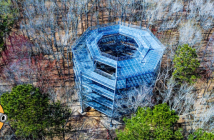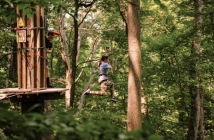As the end of the 2020 season fast approaches, adventure operators face the inevitable staff turnover that comes each year. COVID-19 may exacerbate that. Staff members, especially, are feeling the brunt of the unexpected challenges we have faced while operating amid a pandemic, driving the need for us to reassess how we care for staff so we can mitigate turnover and set ourselves up for success come spring.
What can we do, though, when budgets, additional staffing, and hours have been slashed to accommodate for lost revenue?
COMMUNICATION IS KEY
Let’s start with the basics. Clear, transparent communication with staff is always critical, but has been extremely important this year. With the uncertainty and volatile nature of the 2020 season, staff have been left rattled and anxious about what the future holds. Leadership must keep their employees in the loop in this fast-changing environment. Staff who feel they are being kept in the dark or are the last to know important information may become mistrustful and detached.
Staff should always be informed of operational changes—particularly those with direct impact to staff. This may include temporarily reduced hours, different staffing models, limited capacities, and the potential for any cessations of operation.
Communicate year-round. Continue this communication during the off season so that staff feel included and not left out in the cold. Give staff the opportunity to ask questions, voice concerns, and even offer potential solutions for challenges. Even if site leadership is uncertain as to whether or not staff is returning, including them in email chains, group chats, and the like will make it easier when spring rolls around to determine which staff members plan on returning.

A staff member at Aspen Snowmass Lost
Forest leads kids through day camp activities.
Technology can help keep communication lines open. Many sites have utilized applications such as Slack, When I Work, Homebase, etc. Others have created group chats, Google documents, email chains, or notice boards.
Ideally, these communication tools are updated regularly by leadership and are easily accessed by staff when they are not at work. These communication tools can be introduced at any point during the season, but are especially helpful in the off season when the entire team is not present on-site.
ALL FOR ONE, ONE FOR ALL
A strong sense of community has been central to the success of many organizations this year. Several of the sites I work with on a regular basis refer to their staff as a family (dysfunctions and all). This “family community” has offered support, encouragement, and reprieve for staff during this extraordinary year and has aided in staff retention.
Build your culture. If operators want staff to dive in head-first and be a positive, contributing member of the community, they must create and foster that culture. “All for one and one for all” attitudes generally don’t happen all on their own. Leadership must actively tend the culture of their operations, particularly in these challenging times.
Fostering a sense of “got your back” between management and staff, cultivating and modeling responsible and appropriate behaviors, and weeding out toxic and complacent attitudes are keys to creating a positive staff community. Yes, there will always be cliques and individuals who rub each other the wrong way—but when the overall employee community is strong, people feel supported, cared for, and want to stick around.
As the summer winds down, operators can begin planting the seeds of this culture for the next season. Debrief with current staff about how they feel the season went and what they would like to see happen in the future. Ask them what they are worried about, what they think went right, their hopes and goals for next season, and what they want to see from leadership moving forward. These debriefs can help in goal setting, program implementation, and planning for next spring.
Listen carefully. An important element to a family-community culture is being an active listener, and taking action on staff concerns or suggestions. Operators who listen to staff and implement suggested changes whenever possible will be rewarded with greater staff loyalty and commitment.
MANY HATS
With support staff another casualty of budgetary constrictions at many sites this year, remaining staff members have been stretched thin. Since we may open in the spring under similar circumstances, it’ll be important to plan for operating with a smaller staff.

Staff work their way through the course at The Forge: Lemont Quarries.
Cross training is a great way to compensate for a limited number of available employees. In preparation for the springtime, operators should consider cross training during the slower fall days for standout staff. This will give valued staff members additional experience as well as something to look forward to next spring.
Time for cross training should also be worked into pre-season planning for 2021. Refreshers, new staff trainings, and cross training opportunities are all important pieces to a well-executed pre-season training regime.
Keep it simple. Identifying simple, straightforward tasks that staff can learn quickly in other areas allows for a greater distribution of responsibility. If one part of the operation gets bogged down, staff can jump over and provide extra support.
Keep staff engaged. Cross training also increases staff engagement, as it can break up the monotony of doing the same tasks day after day, and will often inspire staff to pursue further training in that area. Team members that wear many hats are also easier to schedule, more likely to return the following year, and can be extremely helpful in case of an incident as they can fill in roles and assist in the response process.
Develop careers. Cross training and higher levels of training for qualified staff also provide career development opportunities, something Connor James, guest services supervisor at Aspen Snowmass’ Lost Forest Treeline Trail Challenge Course and Canopy Run Zipline Tour, points to as being beneficial for all. “Higher-level certified individuals are paying dividends this year, as they can handle more complex and stressful situations,” says James. “They are more serious about their jobs and the survival of the site, and it gives our Level 1 [guides]something to look up and forward to.”
James also says that staff with advanced training can assist management in areas such as maintenance and incident response, and they can multitask more effectively.
Moreover, providing career development opportunities for staff has been proven to lead to greater staff engagement. Educating your staff on opportunities within your company and in the industry, the resources available to them, and where they can find more information all aid in staff retention. Assisting employees with opportunities for development is good for everyone—employees, operators, and the industry as a whole.
As Richard Branson once said: “Train people well enough so they can leave. Treat them well enough so they don’t want to.”
That said, due to staff turnover, advanced trainings are generally better suited to springtime. It can be gut-wrenching to invest time and money training individuals only to see them leave the company ranks over the winter. However, talking to staff now about career development opportunities in the spring will give them something to strive and return for in 2021.
FRINGE BENEFITS
When compensational benefits are scarce, as they have been for many operations this year, fringe benefits can serve as a useful alternative for building staff morale. Discounts and pro deals with gear manufacturers/distributors, trades with other local businesses, and access to extra activities within the operation are all examples of fringe benefits with little or no cost associated with them.
Offer pro deals. It is simple to set up a pro deal (or direct your employees on how to set it up for themselves), and everyone loves gear! Companies such as Outdoor Pro-Link and Expert Voice allow employers to set up pro deals for employees with a variety of brands. Petzl and other manufacturers offer pro-purchasing programs and pro deals for industry professionals that individuals can set up online with proof of employment (pay stub, business card, etc.). Making fringe benefits available to staff can help them realize direct advantages from their employment with your operation and make them feel more valued.
Little perks boost morale. When it comes down to the day-to-day, James says, “It’s the small things that have made the difference this year. Things like coffee and candy in the afternoon of a hard day go a long way in helping morale.”
At the Lost Forest, James says they have hosted popsicle days, procured a coffee machine for HQ when staff requested one, and did some social-distanced teambuilding that had everyone involved and laughing. “Things like that got our staff excited and recharged,” he recalls. Those small gestures of food, activities, and support can make the difference between happy staff and disgruntled employees.
PERSONAL CONNECTIONS
All that said, when it comes to caring for and helping staff to succeed, few things will reap greater reward than management developing strong personal connections with employees. This is especially important in the time of COVID. Listen to your staff and be empathetic to what they are going through, both at and outside of work. James’ advice is to “know that everyone is going through a weird time right now, and your staff isn’t always going to be OK.”
Take the initiative. The onus is on leaders to ask the hard questions and listen to the answers, whether it’s something you want to hear or not. A manager’s purpose is to support his or her staff in a manner that allows the staff to be more effective in their roles. This may mean jumping up on course to give a hungry staffer a break, or taking the time at the end of the day to check in with employees about how it went and how they are feeling.
The ethical line between “how hard can I push my staff” and “how hard should I push my staff” is a fine one that must be tread with care. We can only know the answer to such questions if we have a relationship with those we work with and understand their emotional and physical limits.
LOOKING AHEAD
Hard lessons were learned across the board this year. Looking to the start of 2021, the most successful programs will be those that identify and implement methods to better care for their staff and adapt to changing times.
Value your vets. Recruitment and hiring will be more challenging next year due to the reduced number of staff this season. Operations that retain personnel from this year will have less work in the spring. Returning staff save us time and money in training, and the veterans can help mentor, inspire, and monitor new team members.
Veteran employees are also (generally) more dedicated to the site and more engaged, which helps to maintain and grow the culture of the site. These experienced team members are often the pillars on which our operations stand. Operators would do well to try to gain understanding now of what will motivate their staff to return next spring and use this information to create a plan for staff retention.
Anticipate change. In planning for next year, sites should have several strategies for staff care outlined in advance because, as we’ve all seen, challenges relating to COVID have a habit of appearing and changing rapidly. Adaptability has been, and will continue to be, key to survival.
Share with, learn from your peers. Shared experience can make this process easier. Concepts that succeed at one site may very well work at others. The proverbial “staff care” wheel does not need to be reinvented at each operation. Conversations between industry professionals have become wonderfully prolific this year, and our industry as a whole will benefit tremendously if these lines of communication remain open.
It’s been a tough year, but the determination and enthusiasm of our employees and leadership has kept us going. We will persevere, and with the help of our staff, climb higher in 2021.






